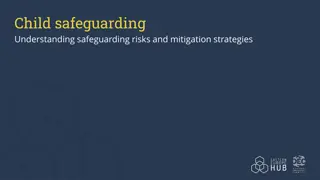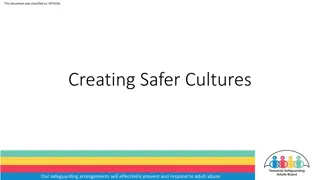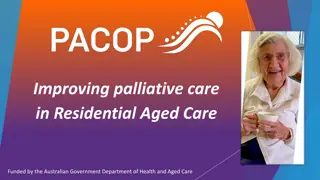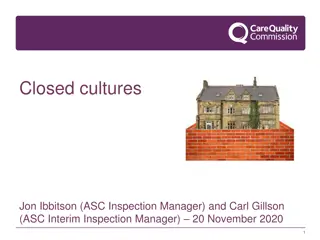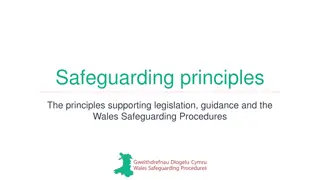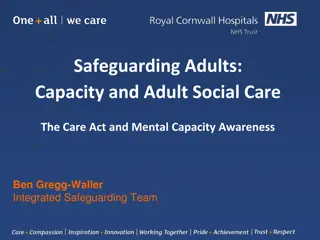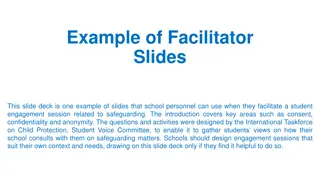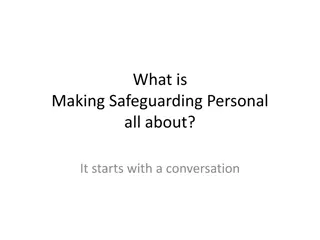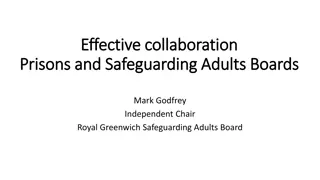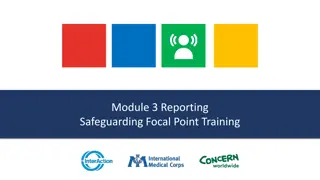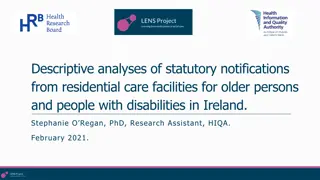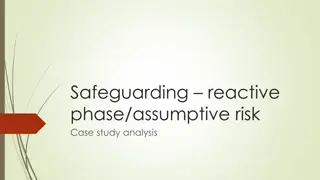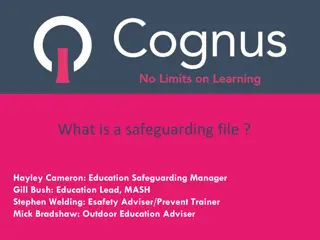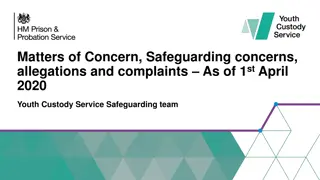Safeguarding Analysis: Risks and Cultures in Residential Care
Explore the critical analysis of safeguarding risks and cultures in residential care settings, delving into the impact of assumptive risk, potential failures in systems, and challenges faced in ensuring the safety of children and young people. Learn about the implications of staff risks, peer-to-peer issues, and the broader cultural context influencing safeguarding practices.
Download Presentation

Please find below an Image/Link to download the presentation.
The content on the website is provided AS IS for your information and personal use only. It may not be sold, licensed, or shared on other websites without obtaining consent from the author. Download presentation by click this link. If you encounter any issues during the download, it is possible that the publisher has removed the file from their server.
E N D
Presentation Transcript
Safeguarding reactive phase/assumptive risk Case study analysis
Aims of session 2 To be able to take a strategic view within the service/ organisation re. safeguarding in all aspects this underpinned by an understanding of risk To understand the structure and impact that a robust safeguarding CULTURE brings. To understand what individuals bring in terms of the perception of risk and bias To be aware of the impact of assumptive risk
risks in residential/service care an overview of main risk areas
Risks FROM staff in residential care 10-12 allegations per 100 children across the UK 2-3 allegations per 100 substantiated allegations physical abuse or excessive physical restraint 75% about men mirrors the data from education Heightened risk of neglect for disabled children Assumptions made and decisions based upon them Blurring of boundaries- never assume it does not happen-and leeway for that young person and the approach to safeguarding A person determined to come into to children s services for their own reasons in accessing children will succeed Perception of risk changes with longer established members of staff- viewed as being less likely to abuse.
What happens when cultures or systems go wrong? regression therapy (Leicestershire)1992 Officially sanctioned Publicly lauded and acclaimed as a good thing pindown (Staffordshire)-report June 1990 Not appropriately monitored and inspected confrontational restraint (Aycliffe)report 1993 Systems and failures like this can happen anywhere- are you sure they could not happen in your home / your organisation? Ongoing child abuse enquiry UK .. Winterbourne View
Risks from other children and young people. child sexual exploitation/CCE Peer on peer/child on child abuse bullying Violence VAWG- violence against women and girls Abuse on social media- various forms emotional abuse relationships Can you be sure that you have safeguarded as reasonably as you can for these issues? What others must you consider ? How do these issues feed into your wider culture?
Building on the first session are these protective factors in place in your service and your home? strong leadership positive staff culture close inclusive relationships with young people high quality supervision effective monitoring and placement review good interagency communication use of LADO child centred, rights based approach calm, authoritative staff, with strategies to respond anger management work with young people if necessary
Managing risk and safeguarding reasonably Uncertainty and risk are features of child protection management cannot eradicate risk: it can only try to reduce the probability of harm . Those involved in child protection must be risk sensible . There is no option of being risk averse since there is no absolutely safe option work Risk The Munro Review of Child Protection: A Child Centred System, May 2011 The big problem for society (and thus for professionals) is working out a realistic expectation of professionals ability to predict the future and manage risk of harm to children and young people Risk assessments are fallible and can err by overestimating or underestimating. A Well thought out assessment may indicate the risk to the family is low, However low probability events happen. Professionals, particularly social workers, currently face the possibility of censure damned if they do, damned if they don t
Risks What influences our reactions to risk? Our own previous experiences- personal and professional Our knowledge/ training/ formal understanding of risk Bias / unconscious bias Competing issues e.g financial Assumptive risk/ assumptions Any other factors?
Unconscious bias Unconscious biases are social stereotypes about certain groups of people that individuals form outside their own conscious awareness. Everyone holds unconscious beliefs about various social and identity groups, and these biases stem from one's tendency to organise social worlds by categorising. Affinity bias refers to when you unconsciously prefer people who share qualities with you or someone you like. It occurs because your brain sees them as familiar and relatable, and we all want to be around people we can relate to. Attribution bias refers to how you perceive your actions and those of others. It stems from our brain s flawed ability to assess the reasons for certain behaviours particularly those that lead to success and failure. We generally attribute our own accomplishments to our skill and personality, and our failures to external factors to hindrances that we believe are beyond our control. We are less likely to blame and find fault in ourselves
Examples of unconscious bias- recognise any? Conformity bias happens when your views are swayed too much by those of other people. It occurs because we all seek acceptance from others we want to hold opinions and views that our community accepts. Confirmation bias refers to how people primarily search for bits of evidence that back up their opinions, rather than looking at the whole picture. It leads to selective observation, meaning you overlook other information and instead focus on things that fit your view. You may even reject new information that contradicts your initial evidence. Contrast effect This type of bias occurs when you assess two or more similar things and compare them with one another, rather than looking at each based on their own merits. Gender bias is simply a preference for one gender over the other. It often stems from our deep-seated beliefs about gender roles and stereotypes. Halo and horns effects you focus on either a positive or negative feature to the exclusion of all else
Case study Records tell us that Liam is 15 years old and that he has a criminal record for offences of damage, violence and theft. The local Youth Offending Team Officer tells us that he doesn t come to his appointments, he is in breach of his supervision order and he is likely to go to prison if he continually non-complies. A colleague from Children s Social Care Services tells us that she knows this family well. The Police say that he is a nuisance and school says he is often absent and when he does attend he is late and disruptive in lessons. Liam never brings his PE kit and he goes missing at lunch times, presumed to be smoking down the high street. Liam s mum says she is fed up to the back teeth of him because he brings trouble to her door . The Anti-Social Behaviour Team has him listed for discussion at their next case conference meeting. The local Youth Service have banned Liam from their activities following an incident where he came into the youth club drunk, disrupted the activities and was suspected to have stolen a coat on his way out. Liam appears to have a constant cold and a deep, hacking cough but his is GP has not seen him since he was 11 years old. The manager of the local supermarket says that he makes his life a misery with his drunken and abusive behaviour outside his shop late at night. Neighbours on the estate say that they are fed up with the family, and need to lock up garden gates to keep their possessions safe from Liam
Case Study Review the information you have and identify the safeguarding risks that could be likely if you accepted this young person in to your Home. The decision has been taken that Liam would be best placed within a residential care setting. His family can no longer cope with him. He is angry and not co- operating What risks are real at this stage what are assumptions? Where may bias sit- unconscious or otherwise sit?
Family Background The Evans family live in a three-bedroomed terraced house in a poor housing estate. Fiona does not work, and Steve has a part-time job. There are no concerns about parental drug and alcohol misuse or domestic abuse, but there are concerns that both parents suffer from depression. Money is tight, but the family are reasonably connected within the community. The family did take advantage of various youth clubs and drop-in community centres, but have not been seen as regularly in the last 9-12 months. Fiona is mother to all three children, white and 38 years old. Steve is father to the youngest two children, and step-father to Liam. Steve is black and 36 years old. Liam is the eldest of three children, white and 15 years old. He has been in increasing trouble within the community and police throughout his teenage years. Liam has not had contact with his father for many years. When Fiona married Steve, Liam was three and his mother changed his surname to Evans. Shirene is 10 years old and of dual heritage. Lewis is 8 years old and of dual heritage
Fiona: I know I am not the perfect Mum but the kids are doing okay .they get a lot more than I did when I was a kid. The main problem is Liam he is not a bad kid but he just seems to cause problems between me and Steve all the time, so he is better off out of the house because those two can t stand the sight of each other but even when he is out of the way, he still brings trouble to my door with the police and the ASB team as the neighbours are always complaining about him. He s nearly 16 now and it s time he stood on his own two feet sorted his own life, he has got lots of older mates with places of their own, so he won t end up on the streets. He s got a lot more going for him than I did at his age he knows where I am if he needs me. My other two Shireen and Lewis are doing just fine. The problem is that people keep poking their noses in to our business neighbours, school and probation. Yes, they have missed some time off school and they don t always make it to the school trips but so what? That school is rubbish anyway and all the teachers look down their noses at us because some of them know me from when I was a kid and remember me being taken into care and you see we won t have our kids being pushed around and we tell them to stand up for them selves with the others if school don t like it then that s tough. School are always saying that Shireen has got nits and that she is passing them on to the others, but how do they know it is her? I have done her hair loads of times and she just keeps getting them again so I don t bother now we can t afford to keep buying the lotion. I don t go down to the school much because I like to keep myself to myself.
. My mum made the mistake of telling our business to the school and the social workers and it didn t do her any good I ended up in care as a kid and I don t have anything to do with my family now. Steve and I have our tough times and sometimes I push Steve too far but we are as bad as each other, especially when we have had a drink. Steve brings in a bit of extra money doing the taxiing, but we are broke most of the time and we just can t afford that expensive stuff that kids want these days. The house is a mess I know, but when you can t afford to do it up, what is the point in keeping it nice I just can t be bothered I used to go round to the local community centre once a week for a coffee when the kids were younger, so they could play with the other kids but I stopped once they were both a full time school. I know that they do courses down there but it is not for me I would feel daft going there on my own now I would love a job but who would employ me? I wouldn t know where to start.
Steve: Life is pretty rubbish at the moment! There is just not enough money to go around and that makes me feel guilty but I can t do anything about it. I love my kids but they don t make things easy especially Liam. He brings nothing but trouble to my door and I ve told Fiona that if it carries on I m leaving. I have done my best with him but at the end of the day he is her son and not mine and he is at an age where he can go it alone sometimes I tell her It is him or me Shireen and Lewis are good kids but they seem to think that money grows on trees Shireen is going through a stage where she won t get out of bed in the mornings and that is causing stress because the school are always on Fiona s back I leave her to get on with it because she knows how to deal with them. Fiona deals with all the family stuff and the school stuff she likes it that way. I bring in a bit of extra cash when I get can a bit of work in the local pizza place and that is the only thing that keeps me going at the moment the extra money means that I can get down to the social club and have some time away from the family without this I would go crazy but Fiona doesn t understand that and it causes a lot of rows she is always winding me up. The house is a real mess, but what is the point in keeping it tidy if it is all falling apart we avoid letting anyone in the house because it looks so bad and the upstairs is even worse
It would be good if I could get back in with my family, because I know that they would just love the kids if they got to know them they would be able to help us out with all sorts of things babysitting, and help with the kids home work, that kind of thing but Fiona won t hear of it because she thinks they look down on her. I want a better life for Fiona and the kids but we are trapped and... Our life is pretty rubbish at the moment ...I can t see a way to make things better
Lewis: My favourite thing is watching wrestling on telly sometimes me and Liam watch the cage fighting I want to be a cage fighter when I grow up I practice on Shireen but she doesn t like it! (laughs). We sometimes do wrestling in the school playground - I get in to trouble but I don t care. My dad say s that I need to know how to look after myself and I don t want the others calling me a wimp. They used to call me names like smelly and stinky, but they don t come near me now cos I stand up for myself. I can t be bothered to go to school and my dad says that I don t have to go if I don t want it s all boring and it won t help me in real life. Sometimes my dad takes me on taxiing jobs to the airport instead of going to school and the people give me tips it s great! Sometimes I sneak out at night to meet my mate Danny and they don t notice that I have gone until ages after my cousin works in the pizza takeaway and he passes us stuff out of the back door so me and Danny get a real feast! I sneak back in the house when it s late and go up to my bedroom and I get away with it without anyone noticing. I once got caught though because me and Danny thought it would be fun to steal some of Liam s cider and we got drunk and forgot to go home. A police woman found us, took us home and gave my mum and dad a warning... ... they gave me what for the next day! Sometimes at the weekend I stay at Danny s house and it is great. I like it there because they have nice beds with soft sheets on them they all get a bed each and they don t have to share like we do. The first time that I stayed at Danny s I didn t know what was going on, when I woke up I thought that it was still night cos it was dark and I realised it was because they had curtains up at the bedroom windows .
Shireen: ..and I would rather stay in bed and watch the telly - especially when it s a cold day. Anyway it is embarrassing if I have to go in without the proper uniform on, and I only have one set - I m not going if I look mucky sometimes my mum forgets to put it in the wash. Anyway the teachers get on at me and it shows me up in front of the others where s your homework Shireen?...where s your P.E kit Shireen Why weren t you in school yesterday Shireen?...you see my mum doesn t like writing the letters when I have been off, so I get all the questions. I did feel really bad this year when all the others in my class got to go to the adventure park and I didn t, but it was ok because my friend Natasha didn t go either so we just went around to her house for the day and watched telly. I love music and dancing and there is a street dance class that goes on at the community centre on a Thursday me and my friends sometimes watch through the window it looks great and the woman asked me if I wanted to come in but I didn t. If my mum had the money she would let me go I know she would. I don t want to ask for too many things anyway because I don t want to stress my mum. Sometimes when I ask for things she gets cross not with me but with my dad for not having a proper job I just don t ask because it causes arguments I like school but sometimes it is just too hard to get up in the mornings... sometimes I can hear them arguing when they think I am asleep. I love going round to my friends for tea because they all sit down together for a meal and we don t do that at home. I wish I could have them back over to my house sometimes but it is embarrassing my mum usually forgets that they are coming the house is a mess and we end up going for some chips
Liam: Yes I did steal a Play Station from my mate.and I got in to trouble with the police. He gets everything and that year I didn t even get present from my mum. The only thing that I got for Christmas that year was 20 from my nan the other time I got into a fight at school because the other lad was calling my mum names making fun of us and saying that we were scruffs my mum told me to give him a good hiding if he said anything about our family so I did it takes me half an hour to get to the youth offending team on the bus and I don t have the money to get there they say that they will give me the bus fares, but that s no good to me cos I don t have the money in the first place to shell out. I go out every night so that I don t have to be in the house, sometimes I don t even go home after school because there is no reason to. I usually get my tea around a mate s house or get some chips if I can blag some, or I go without. I usually stay out as long as I can because I don t get on with my mum s boyfriend and he likes a drink at night so I keep out of his way. I used to get in the neighbours shed with a coat over me, but they found out and rang the police, they thought I was trying to nick stuff. A few times I haven t realised that it was even morning, and have gone there straight from school. The neighbours all complain about me because I have got pissed a few times in the street but what else is there to do? I can t go to the youth club any more cause I m banned from there. I feel awful most of the time tired, fed up, freezing cold and I can t stop coughing I can t go to the doctors though cos my mum said I don t have one. We moved house a couple of years ago... ... so I m not sure where to go now-I feel angry and f***** off all the time.
Has the extra contextual information made you review the safeguarding risks for this placement/ If so why? What have you changed? What next? How did you assess the risk?
We need to distinguish what has brought things about in the past what keeps things going in the present Risk analysis principles to consider what is likely to happen in the future How would you apply this to the Evans case study
Drawing risk from need RISK 2 5
Specific risks RISK Gangs 2 6
Strengths RISK 2 7
Processes to follow: In an event of an incident how do you make the decision to refer? Regulation 40 notifications consider in the light of the Schedule and guidance(July 2020) Schedule notifications (Children s Homes Regulations) are a must What else? Think about potential safeguarding issues ,when you would refer and to whom ..
the process MASH enquiry immediate 24 hours 3 working days for information 5 working days for decision
the process MASH enquiry strategy discussion 15 section 47 investigation working days child protection conference 10 working days core group
Records- what should they look like? be specific who said what, when use actual words of children and parents add analysis why you are worried about what you have seen or heard link to the threshold tool, chronologies set out the actions you think are required what do we know? what do we think? what should we do? Child s full name and date of birth Date and time of the concern Signed , dated with date and time of the record, job role of the person creating the record
So go away to review: The culture- you are the strategic keeper of the culture of your service across all areas and underpinned by safeguarding- be honest .. Is it all in place? Tickbox? Out of date? Needs some work? Evidenced? DO YOU NEED TO DRAW UP A PLAN TO COMPLETE THE CULTURE ARC OF SAFEGUARDING?


